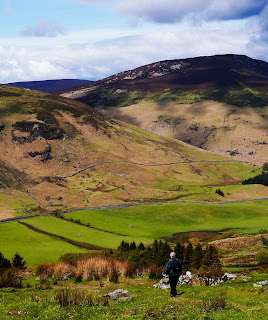Our hill farmers have shaped the landscape and biodiversity in the Wicklow uplands over the past 6000 years. With appropriate management systems, farming has the capacity to continue to provide optimal conditions for upland biodiversity. However there has been a steady decline in hill sheep farming in recent years. This is now associated with under-grazing in some areas leading to a threat to certain types of biodiversity and the accumulation of unmanaged upland vegetation, mainly bracken, heather and gorse.
As witnessed over the past few months this build-up of fuel poses a serious health and safety risk to people living and recreating in the hills and our cherished wildlife and upland habitats. The special nature of the area is recognised by c30,000 hectares of the county now designated as a Special Area of Conservation with the Wicklow Mountains National Park at its centre. Wildfires also pose a serious threat to forest properties (c21% of County Wicklow) across the uplands many of which adjoin the open hill.
In 2011 a Working Group was established by Wicklow Uplands Council to tackle the issue of vegetation management. Representation on the Working Group includes Wicklow hill sheep farmers, recreational users, Teagasc, NPWS, Wicklow Uplands Council and the Irish Uplands Forum. Over 30 meetings and site visits took place over a period of three years examining management issues and gaining an understanding of the perspectives of the key stakeholder groups. In 2013 ‘A Study to Identify Best Management of Upland Habitats in County Wicklow’ was commissioned by Wicklow Uplands Council and launched by the Minister for Agriculture Simon Coveney. The need for support for management of hill areas was clearly identified and a locally led Sustainable Upland Agri-Environmental Scheme (SUAS) was proposed with detailed key management prescriptions. The full study is available on www.wicklowuplands.ie.
The review of the Rural Development Programme (RDP) in 2013/2014 was very timely in this regard and the Wicklow Working Group alongside a National Uplands Group lobbied for the provision of a Locally Led Environmental Schemes under Pillar II. The option for Locally Targeted Schemes was successfully included in the RDP and they will sit on top of the GLAS Scheme and the Basic Payment Scheme in a tiered structure.
In May 2015 the Working Group representatives met with Rural Development Programme officials at the Department for Agriculture, Food and Marine to further discuss the proposal for the Wicklow uplands. They welcomed the Wicklow proposal and advised that an official call for applications for a competitive process will be issued in autumn 2015. Wicklow Uplands Council will be developing our application over the coming months and is hopeful of securing funding. The local schemes are expected to be operational by 2016.
A fundamental feature of the scheme proposed for Wicklow is the development of management plans for upland farms. They will be prepared with input from upland ecologists, farmers and farm planners. They will be based on initial habitat mapping and habitat condition assessments and will specify where and what actions are necessary to enhance habitats and protect key species. While most actions will relate to grazing management, plans may also specify controlled burning with maps clearly identifying areas that are suitable on a rotational basis and areas which are unsuitable for burning such as blanket peat, bracken and areas with vulnerable species. Controlled burning would be carried out by a trained group ideally with the support of the relevant authorities, the Fire Service, Gardaí and NPWS and with careful regard for neighbours and visitors.
It must be recognised that there is a significant difference between the devastation caused by uncontrolled wildfires compared with the use of controlled rotational burning which provides forage and shelter for sheep while creating a mosaic of habitat structures and food for wildlife.
Undertaken responsibly, controlled burning is an important management tool in the future of upland habitat management together with subsequent appropriate stocking levels on the hills. This is a unique opportunity for upland farmers and ecologists to work together to provide the optimal result for upland habitats in County Wicklow while keeping hill farming alive and avoiding abandonment of the Wicklow uplands which is not in the interest of anyone.
Wicklow Uplands Council wishes to present a balanced view of local issues and how we are attempting to overcome them by working in partnership and presenting the perspective of the people who have lived, recreated in and worked the hills for generations.
Author: Lenka Mulligan, Communications Officer, Wicklow Uplands Council


Yes i am totally agreed with this article and i just want say that this article is very nice and very informative article.I will make sure to be reading your blog more. You made a good point but I can't help but wonder, what about the other side? !!!!!!THANKS!!!!!!
ReplyDeleteCertificazioni alimentari
Thank you, Rami, for your comment. We are glad you find our article interesting. We are not sure what do you mean by 'the other side', maybe you could explain more and we can respond then. Thanks for reading our blog!
Delete